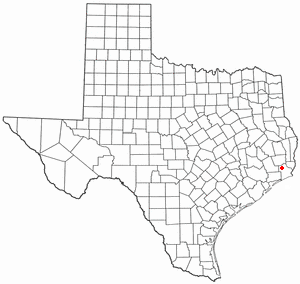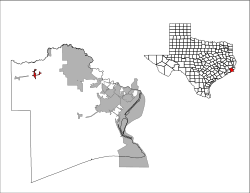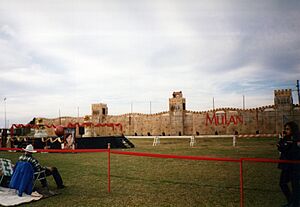China, Texas facts for kids
Quick facts for kids
China, Texas
|
|
|---|---|
 |
|
 |
|
| Country | United States |
| State | Texas |
| County | Jefferson |
| Area | |
| • Total | 1.29 sq mi (3.34 km2) |
| • Land | 1.28 sq mi (3.32 km2) |
| • Water | 0.01 sq mi (0.02 km2) |
| Elevation | 43 ft (13 m) |
| Population
(2020)
|
|
| • Total | 1,260 |
| • Density | 941.45/sq mi (363.40/km2) |
| Time zone | UTC-6 (Central (CST)) |
| • Summer (DST) | UTC-5 (CDT) |
| ZIP code |
77613
|
| Area code(s) | 409 |
| FIPS code | 48-14704 |
| GNIS feature ID | 2409452 |
| Website | City of China, Texas |
China is a small city in Jefferson County, Texas, United States. In 2020, about 1,260 people lived there. It is part of a larger area that includes the cities of Beaumont and Port Arthur.
Contents
History of China, Texas
China was first known as "China Grove." It was a special stop for the Texas and New Orleans Railroad. This stop was named for the many chinaberry trees growing there. In the 1860s, a small community started around this stop. Another community called Nashland grew a few miles away.
How China Got Its Name
A post office named "China" was opened in 1893. In 1906, a fire destroyed the China Grove train station. The railroad rebuilt the station in the larger Nashland area. But they kept the name "China" for the new station. Soon after, the Nashland post office also changed its name to China. In 1971, the communities joined together and officially became the city of China, Texas.
World War II and Chinaberry Trees
During World War II, a small camp was built in China for German prisoners of war. These prisoners helped local farmers take care of rice fields. This was important because many local farmers were away serving in the military.
The chinaberry trees that gave the city its name are now rare. Only a few examples remain, including two trees planted at the city's civic complex in the 1990s. Some local people are working to grow and care for new chinaberry trees.
Disney's Mulan Celebration
In 1999, Walt Disney Home Video celebrated the release of the movie Mulan in China, Texas. They built a small version of the Great Wall of China. It was built on the football field of what was then Henderson Middle School. Today, that building is China Elementary School.
Chinaberry Festival
For many years, China Elementary School hosted an annual Chinaberry Festival. This festival celebrated the city's people and history. It included a parade, local musicians, and booths from vendors and church groups. The school stopped hosting the festival after Hurricane Rita in 2005. The City of China has tried to bring the festival back since then.
Geography of China, Texas
China, Texas, covers a total area of about 1.3 square miles (3.3 square kilometers). Most of this area is land. A very small part, about 0.77%, is water.
Population and People
| Historical population | |||
|---|---|---|---|
| Census | Pop. | %± | |
| 1980 | 1,351 | — | |
| 1990 | 1,144 | −15.3% | |
| 2000 | 1,112 | −2.8% | |
| 2010 | 1,160 | 4.3% | |
| 2020 | 1,260 | 8.6% | |
| U.S. Decennial Census | |||
In 2020, there were 1,260 people living in China, Texas. These people lived in 523 households, and 308 of these were families.
Who Lives in China, Texas?
The table below shows the different groups of people living in China, Texas, based on the 2020 census.
| Group | Number of People | Percentage |
|---|---|---|
| White | 741 | 58.81% |
| Black or African American | 351 | 27.86% |
| Native American or Alaska Native | 3 | 0.24% |
| Asian | 12 | 0.95% |
| Some Other Race | 1 | 0.08% |
| Mixed/Multi-Racial | 51 | 4.05% |
| Hispanic or Latino | 101 | 8.02% |
| Total | 1,260 |
School System
China is part of the Hardin-Jefferson Independent School District. This school district covers a large area. It includes China and nearby cities like Nome and Sour Lake. It also serves communities such as Meeker, Pinewood, Countrywood, and Greyburg.
Schools in the District
Until 2009, China had two schools: China Elementary and Henderson Middle School. A new high school was built in Sour Lake. The old high school became the new Henderson Middle School. The old middle school was updated and became the new China Elementary. Parts of the old elementary school were used as the city hall for a few years.
China Elementary serves students from China and Nome. Students attend from pre-kindergarten to fifth grade. After fifth grade, all students go to Henderson Middle School for sixth through eighth grades. Then, they attend Hardin-Jefferson High School for ninth through twelfth grades.
Before schools were integrated in the 1950s, China Elementary (then China School) was for white students. Henderson School was for African American students. Now, all students attend these schools together.
See also
 In Spanish: China (Texas) para niños
In Spanish: China (Texas) para niños
 | Emma Amos |
 | Edward Mitchell Bannister |
 | Larry D. Alexander |
 | Ernie Barnes |


